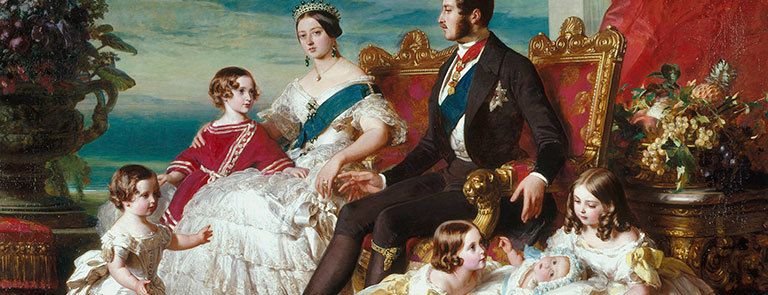
Why Freud Matters
Free UNISA Study Aid Freud
Before we get down to cramming the bleak boring bones of the exam, let’s get inspired by the real passion and outrageousness of the material.
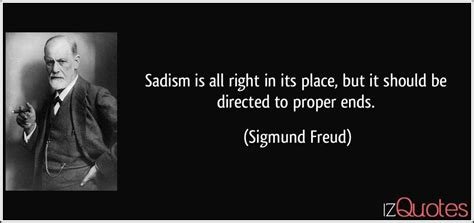
When understanding the revolutions in thought that occurred in the late 19th to early 20th century, Darwin, Marx and Freud were the giants who outraged, challenged and ultimately inspired their own generations and many more to come – right up to today.
Darwin displaced humanity from the center of creation.
Marx overturned the social and moral order, putting dialectic class struggle in its place. He is still upsetting people to this day.
Freud overthrew Cartesian dualism (the mind being Spiritual, and the body material.) This was shocking, transgressive, and seminal. Before you even get to start talking about sex and sexuality.
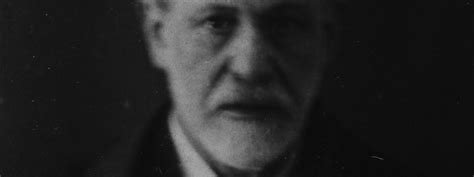
Anatomy is destiny.
Sigmund Freud
5 Free Exam Questions PYV2601 Freud
Read before studying, guess your answers, and check.
QUESTION 1
Which of the following statement/s about the development of the ego is/are INCORRECT, according to Freud’s theory?
(1) The ego begins to develop during the first year of life and is fully developed by the age of six.
(2) The ego begins to develop during the first year of life and continues to do so throughout a person’s life.
(3) The ego begins to develop during the first year of life and continues to do so provided the individual does not become fixated at a particular stage.
(4) The ego begins to develop during the genital stage and continues to do so throughout the remainder of a person’s life.
[democracy id=”1″]
Answer
Ego development
QUESTION 2
Last week Tuesday things went terribly wrong for Ntswaki at work. When she got home, she attacked her husband and their children verbally for no apparent reason. The following day she accused them of being mean and inconsiderate. Which defence mechanism was Ntswaki using according to Freud?
(1) Rationalization
(2) Projection
(3) Displacement
(4) Reaction formation
[democracy id=”1″]
Answer
QUESTION 3
According to Freud, one of the differences between healthy and psychologically disturbed people is in the types of defence mechanisms the two employ to cope with psychic conflicts. Compared to disturbed individuals, psychologically healthy people are more successful at employing the defence mechanisms of
(1) displacement and sublimation
(2) displacement and identification
(3) reaction formation and sublimation
(4) identification and rationalisation
[democracy id=”1″]
Answer
QUESTION 4
Margie visits a therapist about her sudden compulsion to clean everything in sight. She cleans her house twice a day and cannot relax if there is so much as an unwashed plate in sight. She tells the therapist she is a devoted Christian and enjoys a close, warm relationship with her boyfriend. Although the couple is comfortable about their decision to abstain from sexual relations until after marriage, Margie’s compulsion for cleanliness and neatness is causing disunion in the relationship.
According to Freud, Margie could be described as experiencing .
(1) neurotic anxiety
(2) reality anxiety
(3) neurotic and moral anxiety
(4) moral anxiety
[democracy id=”1″]
Answer
QUESTION 5
Mr Wilson is described by his colleagues and staff as a perfectionist and a shrewd businessman who has an amazing knack for saving his company vast sums of money. He is methodical, organised and meticulous. According to Freud, Mr Wilson could be described as having a/an .
(1) genital personality
(2) anal personality
(3) oral personality
(4) latent personality
[democracy id=”1″]
Answer
Summary of key points
You will still need to read the textbook. All of this is drawn directly from Personology from individual to ecosystem by Meyer, Moore & Viljoen.
3 basic assumptions:
- psychosocial conflict – internal drives vs moral norms
- Biological and psychic determinism
- mechanistic assumption: Newtonian physics could be applied to psychic energy – consumption, conservation, transformation
3 personality parts
- id – mostly unconscious, wish-fulfillment, irrational, amoral, biological drives: primary processes (no thinking – just wants) and pleasure principle
- ego – realist, rational, balances id and super-ego: secondary processes (planning and thinking) & reality principle
- superego – internalised social morality = conscience. Moral principle
Cathexis
In psychoanalysis, cathexis is defined as the process of allocation of mental or emotional energy to a person, object, or idea.
Wikipedia
3 Levels of consciousness (earlier Freud)
- Conscious – aware of thoughts and feelings
- Preconscious – Can be brought to consciousness eg memories
- Unconscious – forbidden, painful and frightening drives, wishes and memories
4 characteristics of drives
- Source – from the physical body
- impedus – (energy/intensity)
- goal – satisfy drive
- object – person or thing that can provide satisfaction. Objects can be substituted – for example a dummy is substituted for the mother’s breast. This is called displacement. However object cathexis cannot be completely displaced, which may cause problems.

A matter of Life and Death – Eros & Thanatos: the two types of drive
- Eros: 2 types of life drive ego drive (basic survival) or sex drive (procreation, erotic pleasures, often ‘immoral’)
- Thanatos: Death drive, explaining war, aggression, murder and death
3 ego anxieties
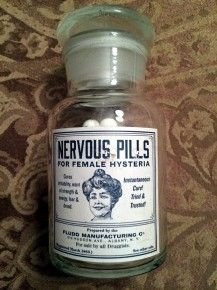
- reality anxiety: Fear of real dangers
- neurotic anxiety: fear of unconscious and unsatisfied drives from id (eg: repressed sexual desire)
- moral anxiety: Fear of moral censure by superego due to forbidden drives and desires
Margie visits a therapist about her sudden compulsion to clean everything in sight. She cleans her house twice a day and cannot relax if there is so much as an unwashed plate in sight. She tells the therapist she is a devoted Christian and enjoys a close, warm relationship with her boyfriend. Although the couple is comfortable about their decision to abstain from sexual relations until after marriage, Margie’s compulsion for cleanliness and neatness is causing disunion in the relationship.
According to Freud, Margie could be described as experiencing:
(1) neurotic anxiety
(2) reality anxiety
(3) neurotic and moral anxiety
(4) moral anxiety
Defence mechanisms
So the sex drive and the death drive may give rise to considerable moral and social discomfort, and are therefore punished by the superego (moral anxiety). These desires may also be threatening in and of themselves. (neurotic anxiety).
In order to cope, the ego creates defence mechanisms.
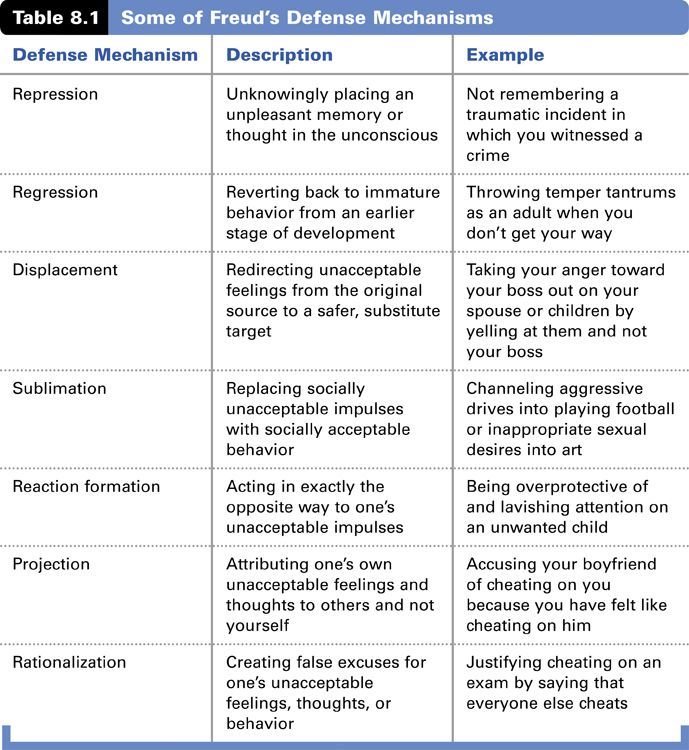
More defences: fixation, resistance, identification
Fixation
Getting stuck at a particular stage of development. Eg a person who is fixated on food would have an oral fixation.
3 causes of fixation:
- pleasure: eg the child is spoiled with food, and grows up to be a foodie.
- Frustrated drive satisfaction eg: the child is never allowed to eat freely, and grows up to be a foodie.
- Fear: the child is afraid of her sexuality, so she grows up to be a foodie instead.
Resistance
This is still a concept applied rather loosely to uncooperative clients in therapy (by therapists).
For Freud, resistance was the the process of continuing the repression of drives and urges that threaten to become conscious.
Identification
This is a positive defense mechanism. Based on the desire to be like someone else. Especially during the phallic stage. eg: boys want to be like their fathers.
This is beneficial because:
- It keeps forbidden desires unconscious (desiring the mother, and destroying the father)
- It gives the forbidden desires an outlet in fantasy: “I can imagine that I am my father.”
- It develops the superego.
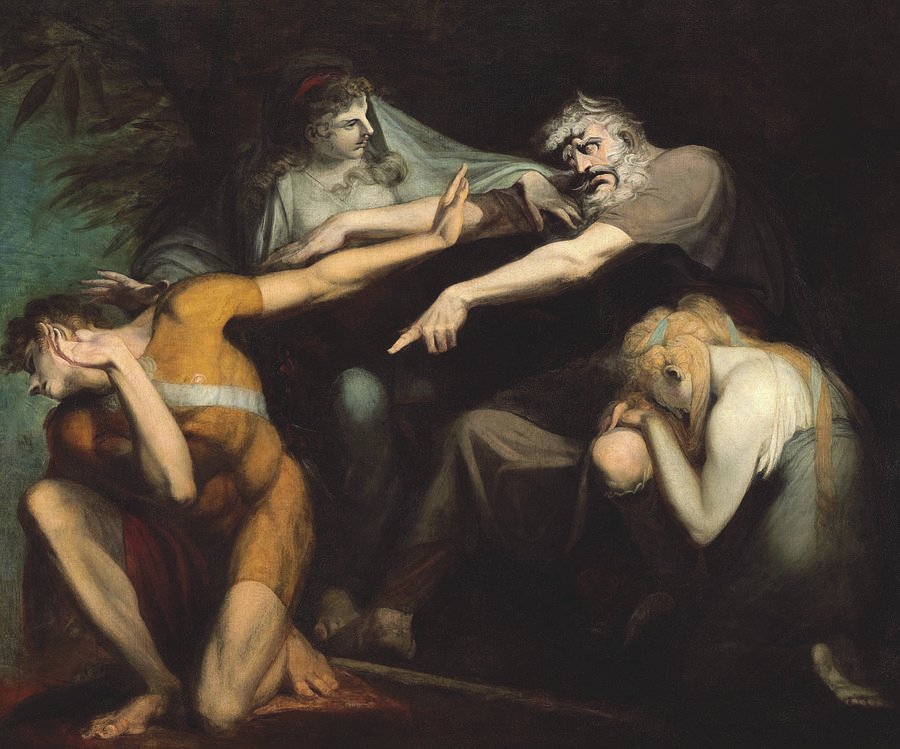
3 positive defense mechanisms
- identification: become like someone else
- displacement: replace a forbidden object of a drive with a permitted one. (this is only partially successful)
- sublimation: Converting a forbidden drive into a more sublime (refined and higher) form – often the arts.
Freud’s Personality Theory
Psychosexual, 4 stages of development.
- Oral: 0 -> 18 months – Babies are orally sexually driven to attain satisfaction from the mother’s breast.
- Anal: 18 months to 3 years old – Children get most pleasure from excretion.
- Phallic: 3 to 5 years old – Children get most pleasure from the genitals. Oedipus and Electra complexes. The boy wants to kill his father and sleep with his mother. The girl develops penis envy. She wishes to woo her father in order to acquire a penis, and feels anger towards her mother for not having one.
- Latent: 6 years old to puberty – The child has repressed, displaced, or sublimated the Oedipal or Electra complexes and identifies with the parent of the same gender. Focused on learning gender roles.
- Genital stage: puberty throughout adulthood.
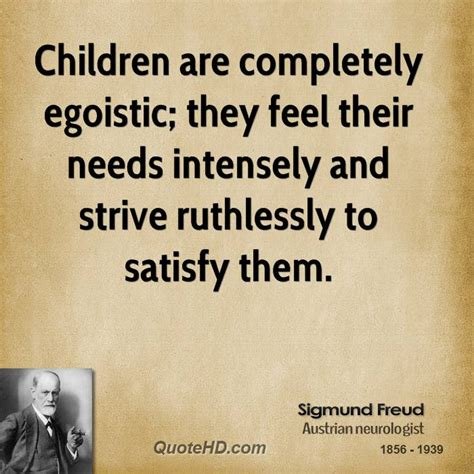
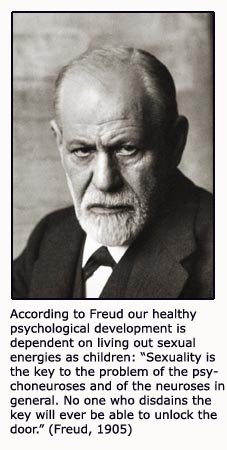
Fixations
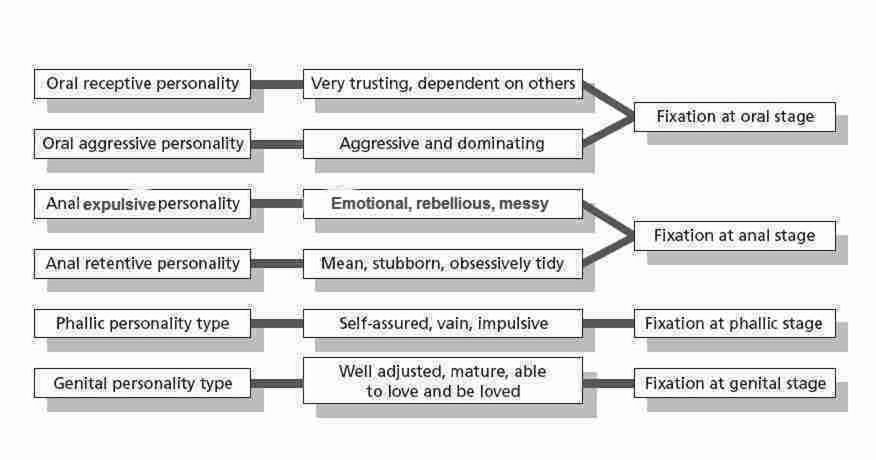
Optimal development
Freud was mainly interested in the problem side of the human psyche, and in fact perceived a continuum between healthy development and psychopathology rather than a boundary as such.
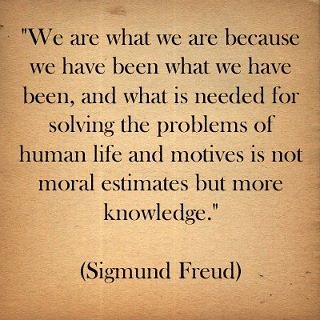
The best-adjusted person would be one that has reached the genital stage of development.
Developmentally beyond earlier stages.
Structurally having a reasonably balanced and strong ego & superego
Dynamically able to sublimate and partially express sexual and aggressive drives in a reasonably happy, moral, and fulfilling life.

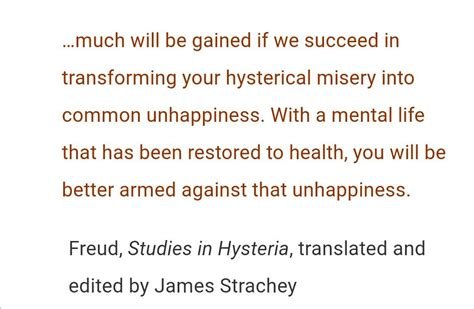
Psychopathology
Abnormal behavior is just more exaggerated normal behavior.
Psychological disorders are caused by an imbalance in the structure of the personality. The ego is too weak to manage conflict between the id and the superego.
This is because of historical causes in psychosocial development eg: fixation, ego underdeveloped, or overdeveloped superego.
And/or contemporary contributory causes such as stressors in the present.
When the ego cannot cope, pathology arises.
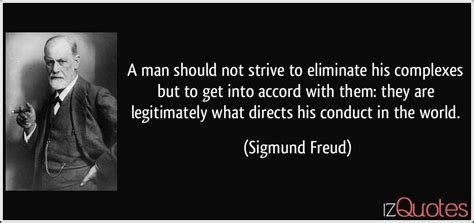
3 types of mental disorder
- neuroses
- personality disorders (fixation and regression)
- psychoses (inability to cope causes the ego to disintegrate, so the person loses touch with reality and withdraws from it)
Neuroses
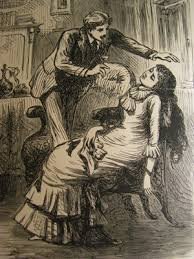
The ego generates symptoms as an attempt to manage overwhelming conflict between the id, ego and superego. The symptom is an elegant solution to an unbearable problem, because it does several things at once…
- It communicates unconscious wishes, much like a dream does. Eg in the textbook, Dora’s sore throat expresses a forbidden wish for oral sex with her father.
2. It punishes her for the moral transgression of her wish.
3. It symbolically satisfies the wish – her throat is examined by a male doctor, and she has to swallow medication.
4. It brings secondary advantages, such as attention and other benefits.
Dreams, accidents & symptoms
Psychotherapy
Orthodox psychoanalytic analysis a la Freud is lengthy and intense.
An hour a day for years, without any guarantee of success.
The therapist hardly speaks and does not react. He sits behind the client who is usually lying down.
The goal is to uncover the unconscious. And to uncover conflict between the drives, society and morality. Then to teach the client ways to get maximum expression of the drives within the confines of morality and of society.
Dreams and free association are important tools in this process.
Key concepts:
- Resistance: To avoid becoming conscious of unconscious wishes and desires, the client resists analysis…. Avoiding a subject, forgetting things, not arriving for the appointment
- Transference: The client transfers feelings of love, desire and aggression onto the analyst. This brings the pain and emotional intensity of those feelings into consciousness so that they may be explored and worked with until integrated into a healthy ego.

Aggression
- inherent
- caused by weak moral code, stronger drives towards aggression, or repressed death wishes
Possible Freudian solutions
- socially acceptable catharsis, sublimation or displacement. Possible expression through identification with a positive role model.
- Strengthening of moral standards
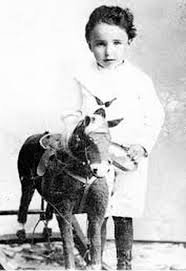
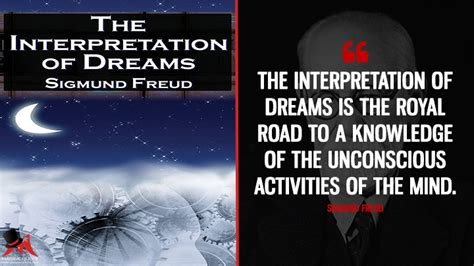

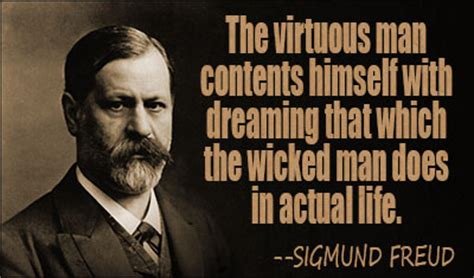

Saved my exam , thank you for these .
Didn’t understand anything when I was just reading the textbook . Thank you for these summaries.